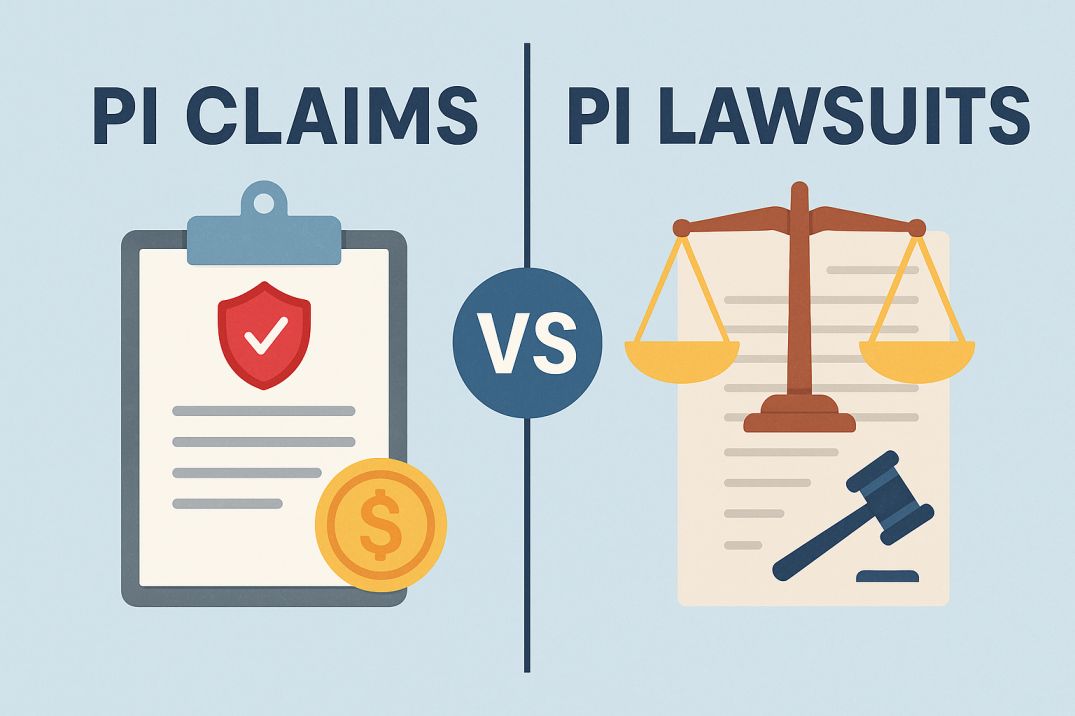Accident happen every day in the US. In fact the CDC reports that around 24 million people visit emergency rooms each year due to unintentional injuries. These include car crashe slip and fall workplace injuries and more. Many of these accidents cause not only physical pain but also financial stress. You may face hospital bill missed work or even long-term health issues.
After an accident most people feel unsure about what to do. You might ask “Should I file a personal injury claim?” or “Do I need to sue?” The right answer depend on many factor how badly you were hurt who was at fault and whether the insurance company act fairly.
If the injury is minor and the other side agree to pay a claim might be enough. But if your injury is serious or the insurer refuses to offer a fair deal you may need to file a lawsuit to get full compensation.
This guide explains both options in simple terms. You’ll learn how PI claims and lawsuit work when to use them and what outcome to expect. Whether you want a fast settlement or justice in court, this article help you choose the path that fits your case.
A personal injury (PI) claim is the first step most people take after an accident. It a formal request for compensation sent to the at fault party insurance company. You explain how the injury happened show evidence like medical record or photo and ask for money to cover your loss. These losses may include hospital bill missed wage or damage to property.
The insurance company review the claim. They may ask question speak with witnesse or look at police report. After this review they either offer a settlement or deny the claim. Many claim end with a settlement which means you accept an agreed amount of money and the case closes.
This process avoids court. That why it usually faster and cheaper than filing a lawsuit. Most people choose to file a claim first because it give them a chance to resolve the issue quickly. According to the Insurance Research Council about 95% of personal injury case settle before trial and many settle during the claim process.
Example:
Imagine someone rear end your car at a red light. You visit a doctor who confirm whiplash. You miss three day of work and pay for physical therapy. You report the injury to the other driver insurance. They admit fault and offer a settlement to cover your cost. This is a typical personal injury claim.
A PI claim give you a chance to recover your money without going through the stress of a courtroom. It works well when the fact are clear the injury is not severe and the other side is willing to cooperate.
Why a PI Claim Work Well
A personal injury claim often give you result faster than a lawsuit. You avoid long court delay which can stretch cases out for month or even years. Many claims settle within a few week especially if the insurance company accept fault early.
You also save money. Lawsuits involve court filing fee expert witness and more legal work. Claims usually cost less because they skip most of those steps. In many case people settle claims without hiring a lawyer at all especially when the injury is minor and the fact are simple.
The process feel more manageable too. You don’t face judge juries or strict legal rule. You deal directly with an insurance adjuster or work with a lawyer to negotiate. This informal approach reduce stress especially for people who have never dealt with the legal system.
When a Claim Makes Sense
A personal injury claim makes sense when your injury is not severe. If you visit a doctor, follow basic treatment, and recover within days or weeks, a claim can handle your case. You avoid the stress of a courtroom and still get fair compensation.
You should also choose a claim if the other party admits fault. When the insurance company takes responsibility and offers to negotiate, it shows they want to settle. This cooperation makes the claim process smoother and faster.
Speed matters in many cases. If you want to move on with your life, a claim offers a quicker path. You get money for your losses without delays. You also avoid the emotional strain that comes with lawsuits, depositions, or trial hearings.
Example:
You walk into a store. There’s no warning sign near a wet floor. You slip, twist your ankle, and need crutches for one week. You visit a clinic, pay for treatment, and miss a day of work. The store’s manager apologizes. Their insurance contacts you and offers to cover your bills. This is the kind of case a simple claim can resolve.
Claims work well when the fact are clear the damage is limited and both side want a fair outcome. You save time money and energy all while getting the support you need.
What Is a PI Lawsuit?
A personal injury lawsuit begins when talks break down. You file a case in civil court. You want full compensation. You want justice.
This path follows court rules. Lawyers collect facts. They exchange information. If no deal happens, a judge or jury decides.
Why a Lawsuit May Help More
Lawsuits can lead to bigger payouts. Courts may give more than an insurance company ever offers. You also force full disclosure. The truth comes out. You set the record straight. You also hold people accountable.
When to File a Lawsuit
Choose this path when your injury is serious. Choose it when the insurer denies your claim. Choose it when they offer too little. Choose it when fault becomes a fight.
Example:
A driver runs a red light and hits you. You suffer a broken leg and lose work. Their insurer avoids blame. A lawsuit protect your right and seeks full payment.
Main Difference Between a Claim and a Lawsuit
| Topic | PI Claim | PI Lawsuit |
|---|---|---|
| Speed | Faster | Slower |
| Cost | Lower fees | Higher legal costs |
| Stress | Easier to manage | More pressure |
| Payout | Often limited | May be much higher |
| Control | You stay in charge | Court makes the final call |
FAQs About PI Claims and Lawsuits
How much can I get from a claim?
Most claim settle between $3000 and $75000. Larger cases may go beyond that.
Can I file a claim without a lawyer?
Yes. Simple cases often need no lawyer. Bigger cases still benefit from legal help.
How long does a lawsuit take?
Many lawsuits take one to two years. Some take longer based on court schedules.
Can I start with a claim and later sue?
Yes. You can shift to a lawsuit if talks fail. The law allows that before time runs out.
What if I share some fault?
You may still recover money. Some states lower the payout based on your share of blame.
Conclusion
A personal injury claim work best when your injury is minor the other side takes responsibility and both parties want to settle quickly. You save time avoid court and get the money you need without stress.
A lawsuit makes more sense when thing go wrong. If the injury is serious or if the insurance company refuse to pay fairly then legal action gives you a stronger way to fight back. You gain access to evidence court protection and possibly a larger payout.
Each option offer a path forward. The right choice depend on your injury your loss and how the other side respond.
Next Step:
Talk to a personal injury lawyer. Ask questions. Share your story. Most lawyer offer a free consultation and only get paid if you win. That first call can help you avoid mistake and choose the best way to protect your right.
Muhammad Suleman Ahmad is a content writer covering lawsuits, legal explainers, and court-related topics for LawsuitDeck.com. His work is structured for clarity and general understanding.



